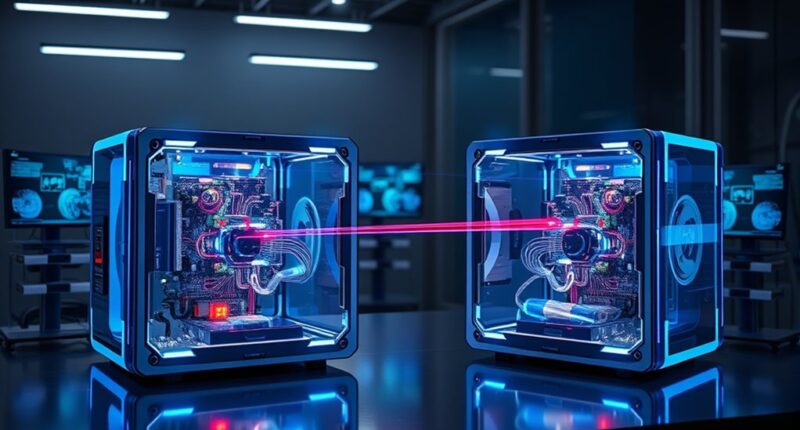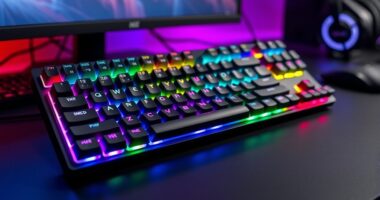In 2025, the top quantum random number generators offering unmatched security include devices that boast quantum phenomena like entanglement and superposition, ensuring high unpredictability. The RNG-01 and similar lab-grade systems stand out because of their proven physical randomness, bias reduction, and robust certification. These devices are ideal for cryptography and sensitive tests, combining security with reliability. If you’re curious about how these advanced tools work and compare, you’ll find plenty of details ahead.
Key Takeaways
- Certified laboratory-grade QRNGs utilizing quantum phenomena like entanglement or superposition offer the highest security for 2025.
- Devices with transparent validation, independent testing, and real-time monitoring ensure unmatched randomness integrity.
- High-security QRNGs integrate quantum key distribution protocols for eavesdropping detection and secure communication.
- Cost-effective, portable quantum RNGs with rigorous security features are emerging as reliable solutions for sensitive applications.
- Continuous advancements focus on bias mitigation, stability, and certification to guarantee top-tier security levels in 2025.
Random Number Generator with PSI Testing Features
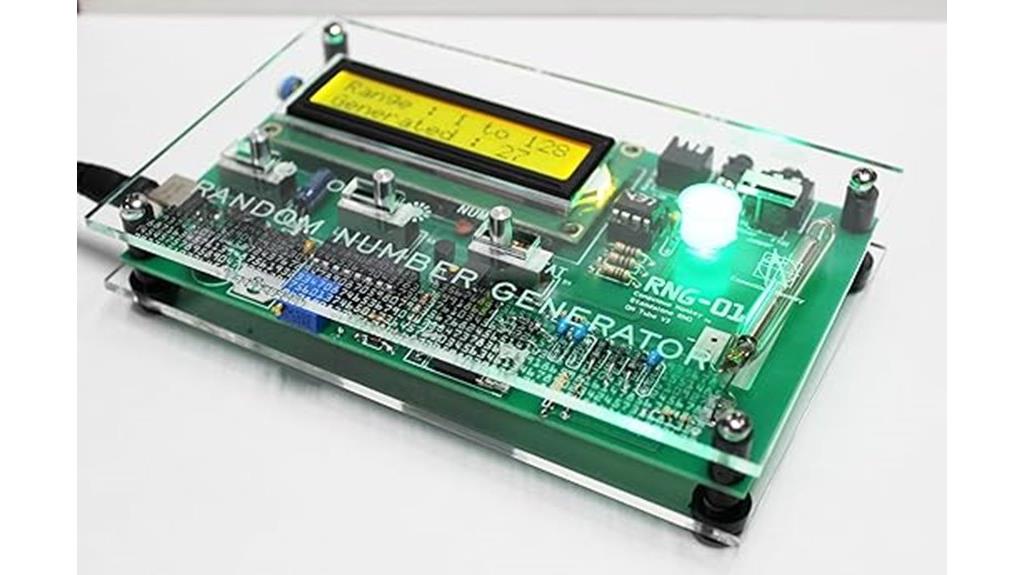
If you’re conducting psi research or experiments involving psychokinesis, precognition, or telepathy, the RNG-01 is an ideal choice because it offers laboratory-grade randomness specifically designed for such sensitive tests. It generates true random numbers based on radioactive decay, ensuring high-quality unpredictability. With its precise detection of disintegrations via a Geiger counter, it produces around 1-3 numbers per minute. This makes it perfect for collecting large datasets for analysis. Its physical randomness helps minimize biases, making it reliable for ESP and PK testing, cryptography, and statistical experiments. Overall, the RNG-01 provides a robust, scientifically grounded tool for advanced psi research.
Best For: researchers and experimenters conducting psi, PK, precognition, or telepathy tests requiring high-quality, true random data for scientific and experimental purposes.
Pros:
- Provides laboratory-grade true randomness based on radioactive decay, ensuring high unpredictability.
- Produces data at a steady rate of 1-3 numbers per minute, suitable for large dataset collection.
- Reliable and well-suited for sensitive applications like cryptography, statistical analysis, and ESP/PK research.
Cons:
- Generates only a few numbers per minute, which may be slow for some large-scale experiments.
- Some units may have minor design issues, such as delicate switches or exposed components.
- Output distribution may exhibit bias or aliasing effects, requiring further analysis for certain applications.
A Small Book of Random Numbers
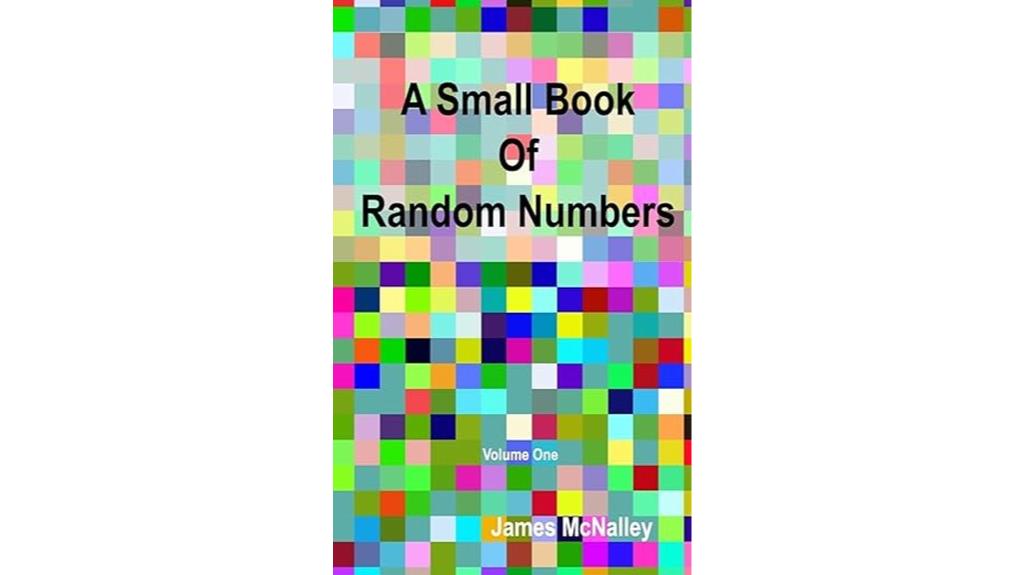
A Small Book of Random Numbers is ideal for anyone who appreciates portability and spontaneity in their reference tools. I find it perfect for tabletop gaming, encryption experiments, or teaching pseudorandom generation. Its compact size slips easily into a pocket, making it convenient for on-the-fly use at parties or during quick reference. The numbers are scattered randomly, offering unpredictability and humor, with no clear pattern. Whether read cover-to-cover or dipped into, it’s engaging and versatile. Some see it as a novelty, others as a practical source of genuine randomness. Either way, it’s a fun, dense, and thought-provoking companion that challenges conventional notions of order and meaning.
Best For: enthusiasts of portable, humorous, and unconventional reference tools who need quick access to random numbers for gaming, encryption, or educational purposes.
Pros:
- Compact and portable, easily fitting into a pocket for on-the-go use
- Offers genuine randomness suitable for encryption and gaming applications
- Provides a fun, unpredictable reading experience that challenges traditional notions of order
Cons:
- Lacks an organized index, making specific numbers harder to locate quickly
- The scattered, random layout may be confusing or overwhelming for some users
- Limited to uniform distribution of numbers, restricting certain statistical or specialized applications
Factors to Consider When Choosing Quantum Random Number Generators
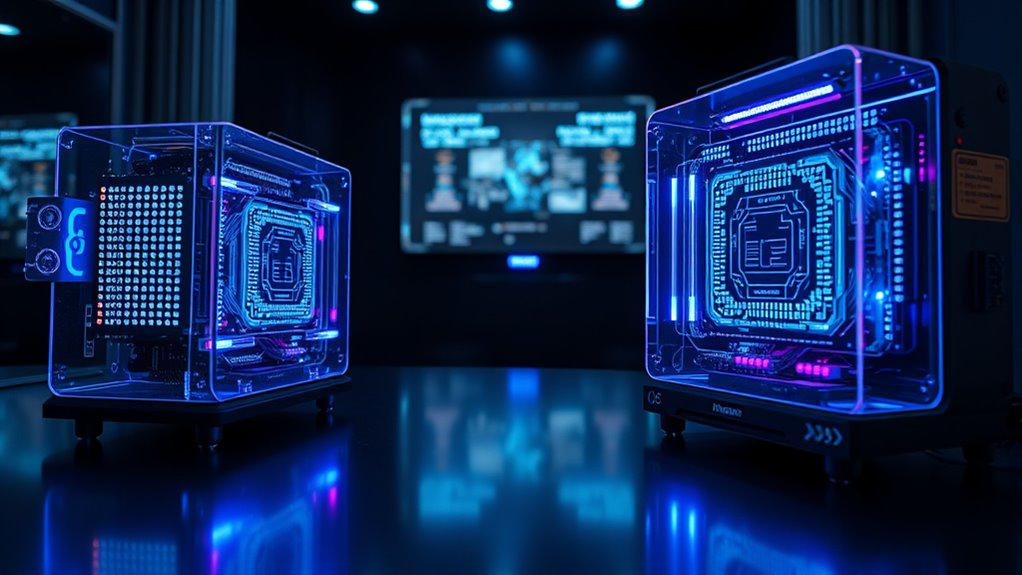
When selecting a quantum random number generator, I focus on key factors like verifying the authenticity of its source and ensuring it can produce numbers quickly and reliably. Compatibility with existing systems and how well it manages noise and bias also matter to me. Finally, I consider the cost and accessibility to make sure it fits my needs and budget.
Source Authenticity Verification
To guarantee you’re obtaining genuinely quantum randomness, verifying that the source depends on fundamental quantum phenomena like superposition or entanglement, rather than classical or pseudo-quantum processes, is essential. I look for devices with transparent documentation and independent third-party validation to confirm their claims. Detailed technical specifications, such as photon detection methods or quantum state collapse, help verify the authenticity of the quantum process. I also prioritize systems with real-time monitoring and statistical testing features that continuously verify their quantum nature. Be cautious of devices lacking clear descriptions or those relying solely on post-processing algorithms, as these may not reflect true quantum origins. Ensuring these factors helps me trust that the randomness truly stems from fundamental quantum phenomena, providing unmatched security.
Generation Speed Efficiency
Ensuring the quantum randomness source is genuine is just one part of choosing the right generator; how quickly it produces numbers matters equally. Quantum RNGs can generate from thousands to millions of bits per second, depending on hardware design. Higher speeds allow for larger data sets, better statistical analysis, and real-time applications like secure communications. Factors influencing speed include photon detection efficiency, laser pulse rates, and processing latency. While faster rates are desirable, they must be balanced with maintaining high-quality randomness. Pushing for maximum throughput can risk introducing correlations or bias, compromising security. Selecting a generator with ideal speed ensures you get both rapid output and reliable randomness, meeting the demands of advanced cryptography and data-intensive tasks without sacrificing integrity.
Integration Compatibility
Selecting a quantum random number generator (QRNG) that integrates smoothly with your existing systems is essential for effective deployment. I focus on compatibility with your hardware and software, ensuring it supports common protocols like USB, Ethernet, or PCIe. It’s important that the QRNG offers standardized, well-documented APIs or data formats to simplify integration into your workflows. You should also verify whether it supports real-time data streaming or batch retrieval, matching your application’s latency and throughput needs. Compatibility with your operating system and development environment is crucial, including drivers, SDKs, or middleware. Finally, consider if the QRNG provides modular or customizable interfaces, allowing adaptation to specific security requirements or integration with cryptography modules. These factors streamline deployment and maximize performance.
Noise and Bias Mitigation
Noise and bias are critical factors to contemplate when choosing a quantum random number generator, as even small environmental disturbances can affect the quality of the output. Environmental factors like temperature fluctuations, electromagnetic interference, and detector imperfections can introduce bias into the generated numbers. To combat this, effective bias mitigation techniques, such as applying randomness extraction algorithms like hashing or von Neumann correction, are essential. Proper calibration and shielding of quantum components help minimize external noise sources, maintaining the integrity of the quantum signals. Additionally, continuous statistical testing and entropy estimation are vital to identify and eliminate residual bias, ensuring the randomness remains secure and reliable over time. Prioritizing these measures guarantees high-quality, trustworthy randomness necessary for secure applications.
Cost and Accessibility
When choosing a quantum random number generator, cost and accessibility are crucial factors to take into account. QRNGs range from affordable consumer devices to expensive laboratory systems costing thousands of dollars. Many user-friendly options are available online at low prices, making them accessible for individual users and small businesses. However, advanced systems often require specialized hardware and infrastructure, limiting their availability to research institutions and large organizations. Regional differences, import restrictions, and local regulations can also influence access to certain models. While some QRNGs are easy to deploy and budget-friendly, others may demand significant investment and technical expertise. Balancing cost and accessibility is essential to selecting a device that fits your needs, whether for casual use or high-security applications.
Security and Reliability
Quantum RNGs harness the unpredictability inherent in quantum phenomena like superposition and entanglement to generate highly secure random numbers that are resistant to prediction and attacks. To guarantee security, many incorporate quantum key distribution protocols, making eavesdropping detectable and safeguarding the randomness source. However, their reliability depends on the stability of quantum hardware and the precision of quantum state measurements, which can be impacted by environmental noise and technical imperfections. Compared to classical RNGs, quantum systems are less prone to biases and external influences, offering a higher trust level for cryptographic uses. Still, rigorous testing and certification are essential to verify their security and consistency, especially in sensitive environments where trustworthiness is paramount.
Frequently Asked Questions
How Do Quantum Random Number Generators Differ From Classical Ones?
Quantum random number generators differ from classical ones because they use fundamental quantum phenomena, like superposition and entanglement, to produce randomness. While classical generators rely on algorithms or physical processes that can be predictable or biased, quantum devices generate truly unpredictable numbers, making them much more secure. I find this fascinating because it means quantum RNGs offer unparalleled randomness, which is essential for cryptography and secure communications.
What Industries Benefit Most From Quantum Random Number Generators?
Think of quantum random number generators as the ultimate treasure chest for digital security. I see industries like finance, healthcare, and government as the guardians that benefit most because they need unbreakable encryption. These generators provide truly unpredictable keys, shielding sensitive information from hackers. It’s like giving these sectors a secret weapon, ensuring their data remains safe and trust remains intact in an increasingly digital world.
Are There Any Known Vulnerabilities in Quantum Random Number Generators?
Yes, there are some known vulnerabilities in quantum random number generators, mainly related to implementation issues. For example, device imperfections or side-channel attacks can potentially compromise randomness. I always recommend using well-tested, certified generators and staying updated on security patches. While the core quantum principles are solid, practical vulnerabilities can arise, so vigilance and proper safeguards are essential to maintain security.
How Does PSI Testing Enhance the Security of These Devices?
They say, “Forewarned is forearmed,” and psi testing really boosts security by detecting subtle anomalies in quantum devices. I use psi testing to verify the integrity of quantum states, ensuring no tampering or hidden vulnerabilities exist. It’s like a digital immune system that catches threats early. So, by integrating psi testing, I can confidently rely on the randomness, knowing it’s genuinely secure and untampered with, safeguarding sensitive data effectively.
What Is the Expected Lifespan of a Quantum Random Number Generator?
The lifespan of a quantum random number generator typically ranges from five to ten years, depending on usage and maintenance. I expect that with proper calibration and updates, these devices can serve securely for quite some time. Regular checks help guarantee they remain reliable, and technological advances might extend their longevity even further. Ultimately, keeping up with maintenance and upgrades is key to maximizing their lifespan.
Conclusion
In my journey through the top quantum random number generators of 2025, I’ve seen how they’re like guardians of digital security, standing watch with unmatched precision. Choosing the right one feels like finding a secret key in a vast universe of options. Remember, a truly secure generator isn’t just about speed or cost—it’s about trust. So, stay vigilant and select wisely, because in the world of cryptography, your security is only as strong as your random numbers.
